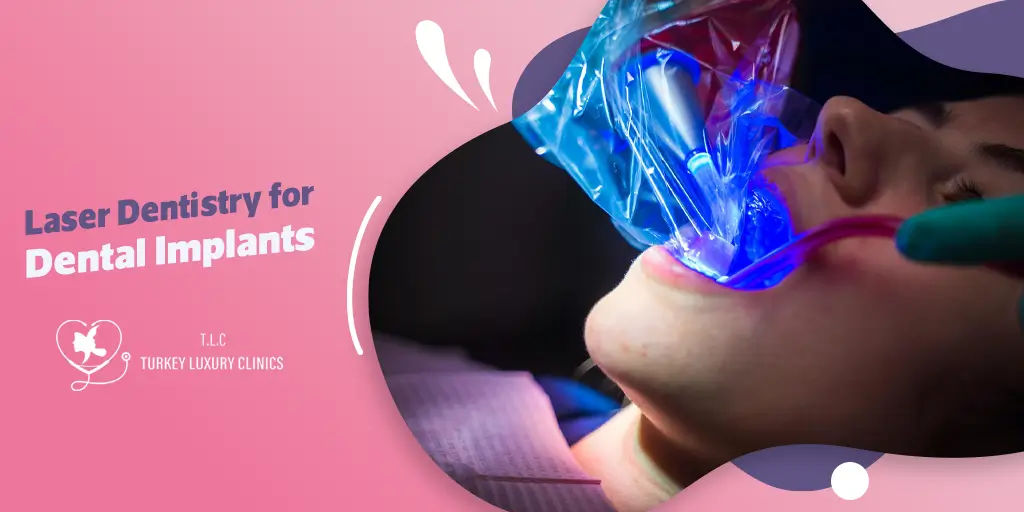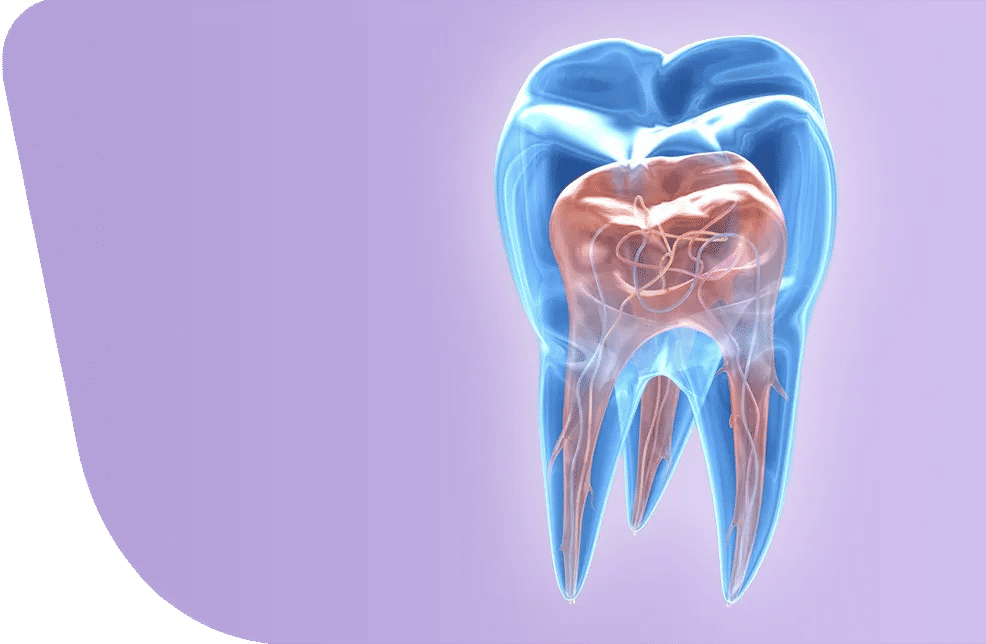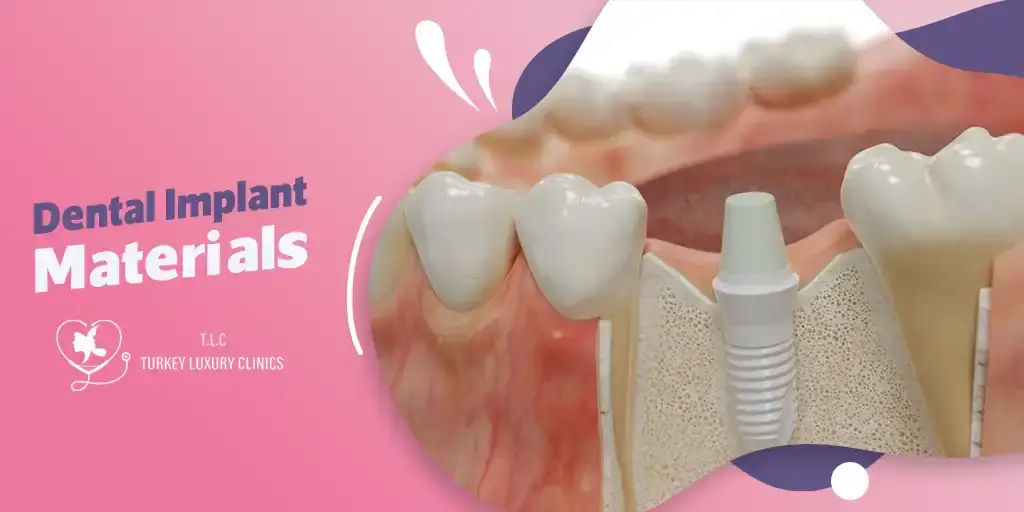- - What is a LASER Dental Implant?
- - Who Needs a LASER Dental Implant?
- - How much is a LASER dental implant?
- - Types of LASER Used in Dental Implant Procedures
- - What are Uses of LASER in Dental Implant?
- - LASER Guided Dental Implant
- - LASER Periodontics & Dental Implants
- - LASER Therapy for Complications or Failing Dental Implants
- - Advantages of LASER Dental Implant
- - Risks of LASER Dentistry
- - Which Country is Best for LASER Dental Implants?
- - Why Choose Turkey Luxury Clinics for LASER Dental Implants
While many people hesitate before undergoing a dental implant procedure due to concerns about pain, stress, and discomfort, LASER dental implants offer an excellent solution. This advanced technique provides a minimally invasive, precise, and more comfortable experience, making it ideal for patients who want safer procedures, faster healing, and reduced anxiety.
Turkey Luxury Clinics offers all types of advanced LASER techniques to make your dental implant experience comfortable, easy, and affordable. Book a consultation today to see if LASER dental implants are right for you.
What is a LASER Dental Implant?
Laser dental implant surgery combines traditional implant techniques with LASER technology. The LASER ensures high precision during surgery, reducing tissue damage and enhancing healing. LASER dentistry uses a high-intensity beam of light to perform various dental procedures related to dental implants with high precision and minimal invasiveness.
During implant surgery, LASER can be used to prepare the gums and surrounding tissue for implant placement, make precise incisions, disinfect the surgical site, and remove diseased tissue, reducing the risk of dental implant infection and promoting faster healing. They also help improve implant success by encouraging better integration with the jawbone.
Who Needs a LASER Dental Implant?
- Patients with gum issues that could complicate traditional implants
- Those who want a minimally invasive procedure with faster healing
- Individuals concerned about pain, swelling, or post-operative discomfort
- Patients are looking for higher precision and reduced risk of infection
Related articles: Are dental implants right for you? Understanding the benefits and considerations
How much is a LASER dental implant?
LASER dental implants are generally more expensive than traditional implants due to the advanced technology involved. Using a LASER during the procedure typically adds $200 to $400 to the total cost of a dental implant.
- In the United States: Traditional implants range between $2,000 and $7,000 per implant. Adding the LASER technique increases the price to $3,000 – $7,000 per implant.
- In Turkey: More affordable packages are available, making it a popular destination for dental tourism. The cost of a single LASER dental implant typically ranges from $300 to $900. The cost of a traditional dental implant in Turkey starts at $150 per tooth.
The overall cost of both traditional and LASER dental implants varies depending on several factors, including the number of implants required, the type of material used, insurance coverage in the US, package inclusions in Turkey, clinic facilities, dentist experience, and whether LASER technology is involved.
LASER Dental Implant Costs in Different Countries in 2026
| Country | Approximate Cost (per single implant) |
| Turkey | $300 – $900 |
| Syria | $350 – $555 |
| Poland | $350 – $2,700 |
| Hungary | $500 – $900 |
| India | $500 – $1,000 |
| Costa Rica | $750 – $1,000 |
| Vietnam | $800 – $1,200 |
| Thailand | $800 – $2,000 |
| Mexico | $1,000 – $1,500 |
| Croatia | €730 / £610 |
| Czech Republic | $350 – $1,000 |
| United Kingdom | $3,000 – $6,000 |
| United States | $3,000 – $7,000 |
Types of LASER Used in Dental Implant Procedures
In dental implantology, four main types of LASER are commonly used to excise or vaporize periodontal tissue and prepare the implant site. Each LASER type is suited for different tasks, whether for hard tissue, soft tissue, or bacterial reduction.
1. Erbium LASER are mainly used for cutting hard tissues like bone. They help shape the bone at the implant site and prepare the area for implant placement with high precision while minimizing trauma to surrounding tissues.
2. Diode LASER are designed for soft tissue procedures, especially around the gums. They are used to reduce bacteria, contour gum tissue, and promote healing around the implant, helping improve recovery and reduce infection risk.
3. CO2 LASER are excellent for soft tissue incisions and coagulation. They provide precise cuts with minimal temperature increase, reducing damage to surrounding tissues and allowing careful management of gum tissue around the implant.
4. Nd:YAG LASER are used for gum treatment, sterilization, and uncovering implants during the second stage of the procedure. They must be handled carefully, as they can increase the temperature around the implant if not used properly.
What are Uses of LASER in Dental Implant?
LASER beams are advanced tools used during dental implant surgery at various stages: pre-implant, during, and post-implant.
LASER light is primarily used during gum incision, disinfection, tissue removal, and gum reshaping, replacing traditional instruments such as scalpels, scissors, and manual scrapers.
1. Soft Tissue Incision
Instead of using a surgical scalpel to open the gums, the LASER makes precise cuts with less bleeding and discomfort.
2. Site Disinfection
The LASER eliminates bacteria at the implant site, reducing reliance on traditional chemical disinfectants.
3. Removal of Diseased or Failing Tissue (Debridement)
In cases of implant failure or gum inflammation, the LASER removes infected tissue, replacing the need for manual scraping or conventional surgery.
4. Gum Tissue Reshaping (Tissue Contouring)
Instead of scissors or traditional shaping tools, the LASER reshapes gum tissue around the implant for better cosmetic results.
LASER Guided Dental Implant
As an innovative choice some opt for combining LASER technology with 3D dental implant technique, a computer-guided planning for a precise, minimally invasive procedure that promotes faster healing and reduces discomfort.
LASERs are used to precisely cut soft tissues and disinfect the surgical site, killing bacteria and promoting a sterile environment. Guided by 3D imaging and custom surgical guides, the LASER-assisted approach helps dentists place implants accurately, minimize tissue damage, and improve overall patient experience and recovery.
LASER Periodontics & Dental Implants
Do you need a dental implant but have gum issues that could complicate the procedure? LASER dental implants are the ideal solution, offering dual benefits: treating gum disease while preparing the site for a safe and effective implant, all while promoting faster healing and a more comfortable recovery.
The LASER first addresses gum disease by removing infected tissue, killing bacteria, and stimulating tissue regeneration. Immediately afterward, the same LASER prepares the site for implant placement, ensuring precise incisions, minimal bleeding, and accelerated healing.
This combined approach reduces the number of procedures, enhances patient comfort, and increases the long-term dental implant success rate.
LASER Therapy for Complications or Failing Dental Implants
Although dental implants generally have high success rates, sometimes problems can develop around them, such as gum inflammation or bone loss (peri-implant mucositis and peri-implantitis).
LASER therapy can help treat these issues by removing infected tissue, killing bacteria, and promoting healing. It is often used alongside traditional nonsurgical or surgical treatments to improve implant health and increase the chances of long-term success.
Advantages of LASER Dental Implant
LASER dental implants offer several benefits over traditional methods:
- Less bleeding and swelling
- Faster healing
- Reduced discomfort and anxiety
- Improved cosmetic results
- Enhanced safety
LASER light is directed more precisely and requires less human handling. This results in a more precise, less invasive procedure, causing minimal damage to surrounding healthy tissues and producing a more predictable outcome.
This technology further enhances implant success rates by lowering infection risks and encouraging bone growth for better integration with the implant.
Key Advantages of LASER Dental Implants
- Enhanced Precision: Targets only the necessary tissue, protecting healthy areas, especially near nerves or in complex cases.
- Faster Healing & Less Discomfort: Sealing nerves and blood vessels reduces bleeding, swelling, and pain, speeding up recovery.
- Lower Risk of Infection: Disinfects the site, killing bacteria and lowering post-surgery infection risks.
- Improved Bone Growth: Encourages new bone growth, helping the implant fuse better with the jawbone.
- Less Anesthesia & Fewer Sutures: Reduced trauma and bleeding can eliminate the need for anesthesia or stitches in some cases.
- Better Visibility: Provides dentists with a clearer view of the surgical site, improving implant placement and cosmetic results.
- Reduced Anxiety: The quiet, vibration-free procedure is more comfortable for patients who fear traditional dental tools.
Risks of LASER Dentistry
In many cases, dental LASER are a safer alternative to the tools used in traditional dental treatments. One of the key benefits of LASER technology is that there is no need to sterilize the device after each use. This allows for precise, pinpoint accuracy, which is essential in many dental procedures.
While LASER dentistry is widely regarded as a highly safe and effective treatment, it is important to note that there are no guarantees it will be suitable for every patient. As with any medical procedure, there may be some risks associated with its use. The specific risks will depend on the type of treatment being performed. Therefore, it is advisable to discuss your suitability for treatment with your dentist during your initial consultation.
Is LASER Dental Implant Worth the Cost?
Yes, the cost of a LASER dental implant is generally considered worthwhile because of its long-term benefits. It is an excellent option for patients seeking a minimally invasive, precise, and comfortable procedure. During dental implant surgery, LASER helps make precise incisions, disinfect the surgical site, and remove diseased tissue, which reduces the risk of infection, minimizes bleeding and swelling, and promotes faster healing.
In more complex cases, LASER-assisted procedures can be more cost-effective by reducing potential complications, lowering the need for additional interventions, and supporting better implant integration with the jawbone.
While the upfront cost may be slightly higher than traditional implants, the improved outcomes, enhanced safety, and quicker recovery often make the investment worthwhile.
Which Country is Best for LASER Dental Implants?
Turkey is a leading destination for dental tourism thanks to several advantages:
- Affordable Prices: Single LASER dental implants start from just $300.
- All-Inclusive Packages: Many clinics include accommodation, transportation, and translation services.
- Modern Facilities: Clinics are equipped with the latest dental implant technologies.
- Expert Care: Highly trained and internationally accredited dentists ensure safe and effective treatment.
- Dental tourism in Turkey: Combining top-quality dental care with sightseeing, cultural experiences, and convenient travel, Turkey is a leading destination for dental tourism.
Why Choose Turkey Luxury Clinics for LASER Dental Implants
Over the years, Turkey Luxury Clinics has become a top destination for dental treatment due to a combination of factors:
Affordability: the cost of dental care in Turkey is significantly lower compared to many other countries, making it an attractive option for those seeking affordable, high-quality treatment.
Highly skilled professionals: Turkish dentists and specialists are highly trained, ensuring patients receive excellent care.
Convenient location: Turkey's geographical location makes it easily accessible for patients from Europe and other parts of the world
Turkey Luxury Clinics Package deals: Turkey Luxury Clinics offers a package including airport transportation, hotel accommodation, a personal interpreter, and full post-operative care.













.webp)
.webp)
.webp)
.webp)

